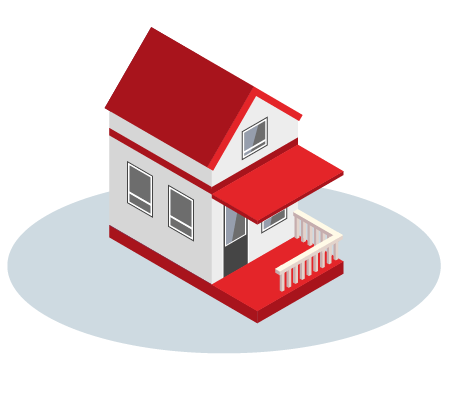Insurance Navy Puts Illinois Homeowners Insurance In Your Hands
Homeowners in Illinois, Texas, Indiana, Georgia, California and Nevada get homeowners insurance quotes with Insurance Navy. We shop the best from 15+ insurance carriers to find you affordable homeowners insurance starting at under $80 a month. Below we've got the current average rates by state and what factors affect your premium.
Homeowners Insurance Rates Vary By Location
Home insurance prices can vary a lot depending on where you live, how much your house is worth and any claims your home has had in the past. Below are some average annual premiums for a $300,000 house with $100,000 liability.
Illinois - A Mix of High and Low Premiums
Average: $1,850 a year or $154 a month
If you live in Chicago or Cook County, you can expect to pay up to 20% more per year on your premiums because of the area's high rate of theft and old housing stock. Areas like Springfield and Champaign on the other hand average $1,400 a year. Most of the state's losses due to wind and hail that also drives up loss claims.
Texas - Coast vs Country
Average: $2,550 a year or $212 a month
If you live in counties that have a high risk of hurricanes like Galveston or Harris County, you're looking at premiums that are more than $3,200 a year. In the Dallas-Ft Worth area, you might pay $2,300 a year because of the high risk of hail. Texas also has a special deductible for wind and hail of 1-2% of the value of your house.
Indiana: Tornado Alley
Average: $1,350 a year or $112 a month
Indianapolis is a bit pricier with a yearly premium of $1,500. However, if you live in the southern part of the state in a rural area, you can get a policy for less than $1,000 a year. Tornadoes and severe storms drive up premiums in central and northern counties.
Georgia - A Mix of High and Low
Average: $1,950 a year or $162 a month
The Atlanta area averages $2,100 a year. However, the coastal areas around Savannah and Brunswick are even higher because of the risk of hurricanes. The mountainous areas of northern Georgia typically pay less, about $1,600 to $1,800 a year.
California - Wildfires a Major Factor
Average: $1,500 a year or $125 a month
Wildfire zones in Los Angeles, San Bernardino and Sonoma counties are seeing premiums go up to $3,500 a year. Some of these high-risk areas require coverage through the California FAIR Plan. Earthquake insurance is a separate cost and can add an extra $800 to $2,000 a year.
Nevada - A Breeze
Average: $1,200 a year or $100 a month
The Las Vegas area averages $1,350 a year. If you live in an area like Reno or a rural area, you can typically get a policy for less than $1,000 a year. Because of the minimal severe weather and low precipitation, Nevada is one of the more affordable states for homeowners insurance.
What Affects Your Homeowners Premium
Discounts Available for Homeowners
Bundle Home + Auto
Security System
New Roof
Impact-Resistant Shingles
Claim-Free
Paid In Full
Mortgage Requirements
Homeowners insurance isn't mandatory by law, but your mortgage lender will require you to have a policy that covers at least 100% of your loan balance or the cost to rebuild your house. If you fail to get the required coverage, your lender can buy a forced-place insurance policy on your home, and it can cost 2-3 times as much as a regular policy with little protection. And you'll still have to prove you have insurance at closing and at renewal.
Insurance Carriers We Work With
Insurance Navy shops for you with 15+ insurance carriers, including Kemper, Bristol West, National General, Progressive and Geico. People with clean claims history and good credit scores (700 or higher) can often get policies that are 15-25% below the state average.


